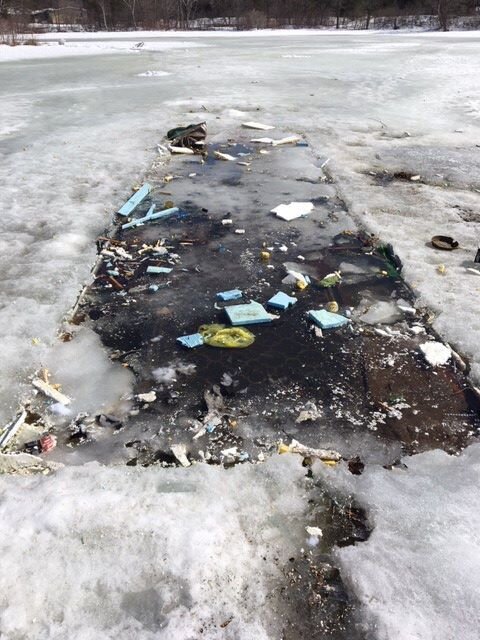Photo courtesy MN DNR.
At the end of last ice season, I read a disturbing first-hand account of a lakeshore owner who spent a few days picking up trash on her hometown lakes. She was careful not to accuse any group or point fingers, and simply stated everything she had found immediately after the ice receded in South Central Minnesota. It mimics what I’ve seen in the springtime as well, from beachheads of washed up 1lb propane cylinders, to dead fish and worse, she didn’t reveal many surprises to anyone who’s walked around open water immediately following ice season.
Most of the items she found had some relation to alcohol or tobacco products, from empty beer cans or bottles, to cigarette butts, packs, and wrappers. Again, it’s not an affront to those who legally enjoy their use, but it is a direct assault on anglers who Illegally discard them. Littering carries a fine, but unfortunately is rarely ticketed, which is why self-policing among us anglers should be common practice.
The next most common thing she found was anything and everything related to human excrement. While it’s neither fun to write about or read, we all know it’s a fact of life, so why is it rare that we would prepare for such an event? Actual feces, toilet paper, paper towels littered shorelines, as did many plastic bags filled with poop. Anyone with animals or pets would know that we’ve been acting like one by doing our business and not cleaning up after ourselves.
Also common were fish-house related items, as if more smoking guns were required to make the case. Lots of blocking material and fish house materials such as foam, roofing, hole cut-outs, plastic, and furniture pieces were among the mess discovered. Random trash items from candy-bar wrappers, receipts, tackle packaging, plastic utensils, and minnow buckets were also top items found on several lakeshores. There was even an old football, plenty of beef jerky, and soiled underwear washed ashore at the end of March on several of these lakes.
She went on to express how heartbreaking it was to see the same people who enjoy these resources be the ones that polluted them. While describing how these were the same waters she learned to fish on, she talked about how fish and wildlife suffer in such a scenario. Kudos to her for doing something about it, and I think it’s high-time we each start doing something about it also. Knowing that this is the beginning of the season, and litter patrol starts now, not later, here’s a few things I think we can all do a better job at.
Leading by Example – Younger generations learn by how their elders act, and if it’s acceptable behavior for family members, then it’s how they’ll proceed.
Make a Plan – Just like you wouldn’t fish without a flasher, you should never be caught without a trashbag or three. Consider them standard issue for anglers everywhere, and make sure to use them. If you know you’re going to be cooking on the ice, or staying for a period of time, make a plan for how you’ll be handling food scraps and human waste. Bags and buckets are simple and cheap.
Re-usable Options – Instead of a plastic grocery bag, haul your food out in a cloth one. Don’t throw-away 1lb propane cylinders, look to the refillable options. Small plastic flies around in wind and snow, so repackage your snacks at home without all the wrappers.
Carry a Chisel – So often I see the excuse “it’s frozen in.” Whether it be by slush or water on the ice, you can chisel out almost anything with some work and determination. It could be corner blocks for your fish-house, or fabric you tore from a portable shelter, just remember to chisel it out if you brought it on.
Public Shaming – I say this only slightly in jest, as a few choice comments to friends or strangers alike can have a profound impact. Explore their guilty side by reminding them that their actions are unacceptable in whatever humorous (or non-humorous) way you can. You don’t have to be angry, combative, or even negative, but it’s all of our duty to make sure we keep this place clean. When all else fails, pick up their mess and let them know you did it, reminding them that even the neighbor’s dog isn’t allowed to poop on their lawn; at least without some acrimony.
Influence Policy – This could be at a local or state level to include trash receptacles at landings. In the past, these options have been difficult due to illegal dumping of trash at these sites, but some of the more popular waters in Minnesota, like Upper Red Lake, have had to find ways to fund a trash facility. Without it, they’d be swimming in refuse come spring. Lake associations would do well to try to fundraise for such efforts, though I completely realize the inequity that already exists with local lakeshore owners cleaning up messes, and now funding their prevention of pollution.
Sadly, my fear is that someday we become prohibited from enjoying that which we consider a common right, simply because the exercising of it creates too big of a mess.
Photo Courtesy MN DNR.
Photo Courtesy Guy Cunningham.


